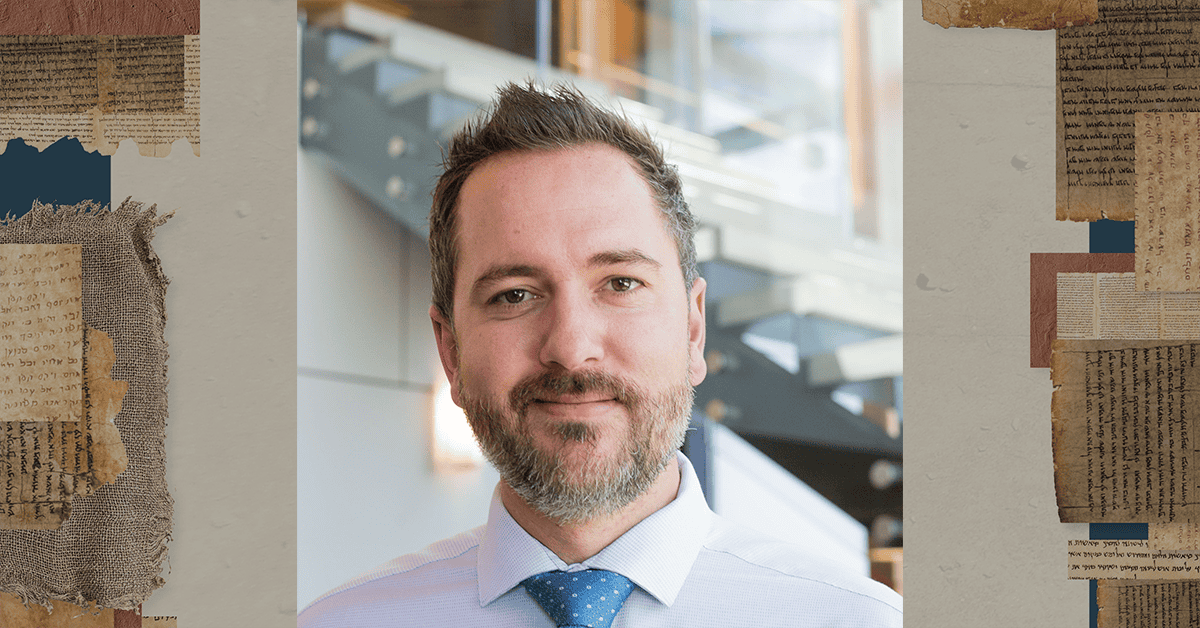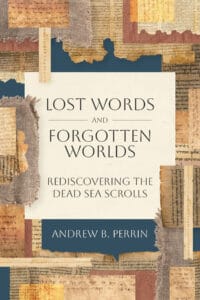
In Lost Words and Forgotten Worlds: Rediscovering the Dead Sea Scrolls, Andrew B. Perrin reintroduces readers to the scrolls while correcting common misunderstandings and highlighting overlooked issues.
In our interview below, Perrin discusses goal of bringing the highly technical world of the Dead Sea Scrolls to a wider audience.
Andrew B. Perrin is associate vice president of research at Athabasca University in Alberta, Canada. Previously, he was director of the Dead Sea Scrolls Institute at Trinity Western University and Canada Research Chair in Religious Identities of Ancient Judaism.
Lexham Press: Hello Andrew. Thank you for participating in this interview. Let’s start by telling us something about yourself that only your friends or family would know.
Andrew Perrin: When I’m not neck deep in research and writing ancient manuscripts, I write, record, and produce my own music. I have a small home studio and play/perform locally. Most of my music is a blend of acoustic driven Americana and light rock.
LP: A true Renaissance Man! We’re sure that those reading this would also be excited to know the story behind Lost Words and Forgotten Worlds: Rediscovering the Dead Sea Scrolls. Can you describe its basic thesis?
Perrin: The scrolls are an exciting and intriguing world—even for those who don’t really know what they are, they know there is something curious and cool about them. There are several solid textbooks out there, some of which are getting a bit outdated, but as I researched, taught, and spoke on the scrolls, I became increasingly aware that even these were too “textbooky.” We didn’t need so much of an “introduction” to the scrolls, but an “invitation” to them. In the 1950s and 1960s, there were a ton of books that were short overviews of the scrolls (as much as we knew of them then) that were very much geared towards a wider audience. My book attempts to hit that mark and bring back the genre of accessible, engaging, and inviting tours through the scrolls for students and the wider public. And, frankly, I tried to write it in a way that was actually enjoyable—this is a book rooted in research but not weighted down by academic-ese. You don’t need a PhD to read this book and enjoy it!
The scrolls at once CHALLENGE, CHANGE, and CONFIRM what we know/knew about the words of scripture as well as the worlds around it. My book unpacks this from multiple perspectives including: the scribal formation of biblical literature in a precanonical period, the social and cultural worlds of Christian origins, the reality and problems of modern forgeries, the explosion of writings in Aramaic, and fresh takes on the discovery stories and archaeology of Qumran.
LP: Can you tell us what contribution you hope to make with your book?
Perrin: There are two main contributions I’d like to see: (1) To introduce the scrolls for a new generation of readers or students who are yet to encounter them and (2) reintroduce the scrolls to those who might be familiar to them but could be challenged to think differently about core interpretive issues. The scrolls are a massive opportunity for readers of all types—and across confessional traditions, or none at all—to encounter manuscripts/archaeology that help us explore the shared basis of Western culture as well as the scriptural heritage and worlds that are the common soil of both Judaism and Christianity.
For example, everyone knows forgeries are big problems! But what folks might not know is how they are detected and some of the ethical reasons why they present challenges for research, institutions, and ultimately individuals working with these sources. This chapter of the book aims to thoughtfully balance criticism and learning in this complex issue.
Another example would be the new perspective on how scriptural traditions often were developed in the orbit of ancestral figures (Moses, Jeremiah, David, Daniel, Miram, etc.). We often think of “books” of scripture but in most cases, these books that were canonized are part of a larger body of traditions associated with those figures in the ancient world. So when I engage the biblical scrolls at Qumran (I take two chapters!) I do this starting in the details of text criticism but then zoom out to speak to how some traditions, like those of Daniel, are known in a surprising number and linguistic diversity at Qumran (Hebrew. Greek, Aramaic).
LP: What was a particularly surprising or enjoyable aspect that you discovered from writing your book?
Perrin:. I mentioned earlier in the interview, I’m a professional scholar and hobbyist musician. The common denominator here is that I am simply a writer. I think great songs and great books should be simple to read/listen to and feel human. What I enjoyed most about writing this book was bringing my humanity into it: I tell anecdotes, little personal stories, even a few bad (or dad) jokes. This is the first book I’ve written where I feel like you not only get Andy the “scrolls scholar” on the page but in fact get to know a bit about me (my story, my personality, my quirks) through it. I was so fortunate to have an editor at Lexham who supported this approach and was gracious enough to let some things slide (like my reference to the Beastie Boys, look it up in the index) and honest enough to tell me certain references would be lost on most (like when I tried to reference the Oregon Trail video game from the 1980/90s…he was right!). Ultimately, I take my research on the scrolls very seriously, and my writing style even more so. But I try not to take myself too seriously. I hope folks get a sense of that when they read the book. Ideally it feels more like a conversation with me than an 80,000 word lecture.







